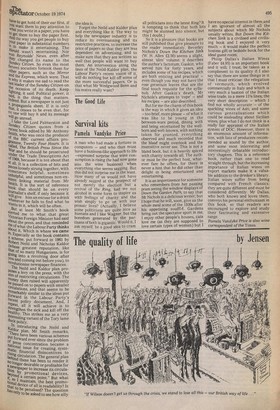The Good Life
Survival kits
Pamela Vandyke Price A man who had made a fortune in computers — and who thus must have a business-like approach Co life —expressed surprise that wine consumption is rising (he had now gone into the wine business) when everything else seems sagging. But this did not surprise me in the least. How many of us would not have already sagged at the prospect of not merely the election but a revival of the Ring, had we not alcohol in some form to inspire us with feelings of charity and the wish simply to go on with our prosaic lives? (Actually, i believe some politicians are quite nice as humans and I like Wagner, but the boredom generated by the partisans of both is gigantic. Would it, ask myself, be a good idea to cram all politicians into the latest Ring? It is tempting to think that both lots might be stunned into silence, but this I doubt.) So it is a pleasure that books are still published that give pleasure to the reader immediately. Beverley Nichols's Down the Kitchen Sink (W. H. Allen £2.50) seems a slight, almost `slim' volume: it describes the author's factotum, Gaskin, who served him for forty years, and includes some of his recipes, which are both enticing and practical — even though you may not have the rose geranium leaves that are the final touch requisite for the syllabub. After Gaskin's death, Mr Nichols's attempts to `cope' — and his recipes — are also described. But for me the charm of this book is the way in which it gives an idea — too brief, more please — of what it was like to be young in the between-wars period, dining with and being entertained by the wellborn and well-known, with nothing taken for granted, everything observed and much recorded that the blase might overlook and the insensitive never see. This is not a bland book, but it is heavily spiced with charity towards all. The author must be the perfect host, whatever fare he offers, for there is never a hint that he did other than delight in being entertained and entertaining. It is an impertinence for someone who remembers• from her passing pram seeing the window displays of Down the Garden Path, to say that Mr Nichols is a delicious writer; but I hope that he will, soon, give us the whole meal scene of the 1930s after his appetising souffl 6. Gardens bring out the spectator sport in me, I enjoy other people's houses, cats love me (as they are supposed to love certain types of women) but I have no special interest in them and I am ignorant of almost all the subjects about which Mr Nichols usually writes. But Down the Kitchen Sink is a civilised and civilising book and I enjoyed it very much — it would make the perfect hostess gift or bedside book for the ideal guest room.
Philip Dallas's Italian Wines (Faber £4.95) is an important book and it will, I trust, be taken as a compliment to its quality if I also say that there are some things in it that I must criticise: the relegation of vermouth, which evolved commercially in Italy and which is very much a bastion of the Italian wine trade, to a mere 111/4 lines.; the very short description — which I find not wholly accurate — of the sparkling wines of Asti, and some curious generalisations which could be misleading about Sicilian wines, plus what I do not think is a really fair appraisal of the Italian system of DOC. However, there is an enormous amount of information, with lists of producers recommended as sound by the author, and some most interesting and interestingly debatable introductory chapters. This is a reference book, rather than one to read straight through, but the increasing importance of Italian wines on export markets make it a valuable addition to the drinker's library. Italian wines suffer from being compared with French classics; they are quite different and must be considered differently. Mr Dallas, who both knows and loves them, conveys his personal enthusiasm in this book, so that readers are encouraged to explore and study their fascinating and extensive range.
Pamela Vandyke Price is also wine correspondent of the Times.


































 Previous page
Previous page